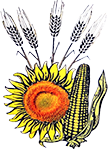Increase Productivity, by the Creation of Biodiversity, on Agricultural Crops, Corn and Sunflower
Gabriel Popescu1, Maria Joiţa-Păcureanu2, Daniela Horhocea2, Laurențiu Ciornei1,
Petruța-Simona Simion1, Victor Petcu2, Florin-Gabriel Anton2
1Centrul de Studii și Cercetări de Biodiversitate Agrosilvică
”Acad. David Davidescu” Bucureşti
2Institutul Național de Cercetare-Dezvoltare Agricolă Fundulea
Keywords: maize, sunflower, genetic diversity, yields.
Abstract: In agricultural production is used a variety of field crops, composed of species, varieties, hybrids, which represent cultivated plants, which differ from each other, through the biological cycle, the requirements of vegetation factors, their morphoanatomy, production destination. The biodiversity of agricultural plants is vital for mankind, being the only safe source of food. Therefore, the conservation and protection of cultivated species, useful to humans, as well as their varieties is one of the pillars of sustainable development of agriculture and determines the health of the population. The biological components of a technology are represented by species, varieties, hybrids, which underlie biodiversity in number and economic importance.
Maize is one of the most valuable cultivated plants in the world and in Romania, being used in human nutrition, animal husbandry and industry. As a result, complex programs for the improvement of maize, in order to obtain commercial, high-performance hybrids that meet the requirements of the market, are being carried out in the world. Such a program also exists at the NARDI Fundulea. Within the breedings programs, important genetic advances have been obtained, regarding productivity, different agronomic and physiological properties, but also the adaptation to the conditions of abiotic and biotic stress.
By creating a diversified initial material, using valuable germplasm, valuable inbred lines with superior properties were obtained, making it possible to obtain new, high-performance hybrids and possessors of the property of rapid loss of water from grains, reaching maturity, at a humidity close to 14%.
At sunflower, a plant of oil culture, very important in Romania, valuable genotypes have been created, with properties that ensure the achievement of very good productions, a high oil content in seeds. The creation of new sunflower genotypes is done taking into account the requirements of the seed market, in the case of this crop plant, there are currently 24 market segments, due to the many changes that occur, taking into account the resistance to certain pathogens/parasites, resistance to a certain type of herbicide, a certain quality of the oil.
Thus, in recent years a series of new hybrids have been created, almost all with herbicide resistance, which allows the realization of very good seed production.
In the present study, we aimed to highlight the importance of creating genetic diversity, hybrids with new features, which would allow overcoming the economic/financiar performance of previously made hybrids.
